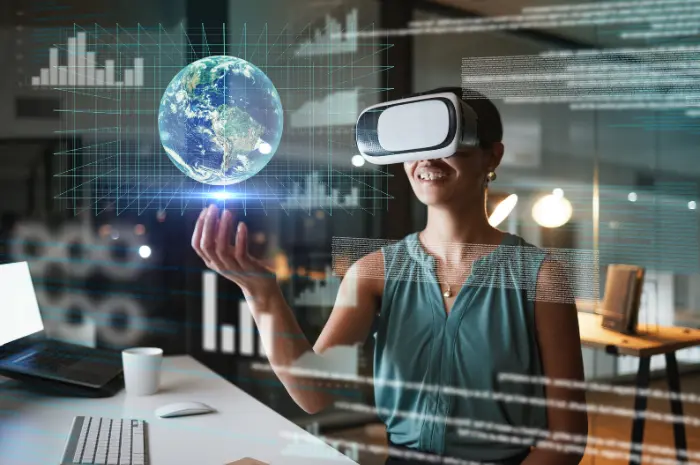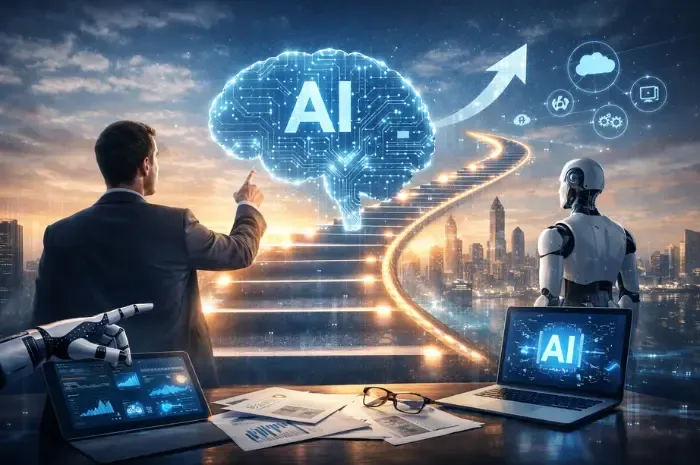According to a report, McKinsey estimates that the Metaverse has the potential to generate up to $5 trillion in value by 2030. This growth is anticipated across sectors such as e-commerce, virtual learning, advertising, and gaming. AI is identified as a pivotal enabler in this expansion, enhancing user experiences through personalization, intelligent avatars, and dynamic content generation.
This blog explores how AI is transforming the Metaverse, its impact on users and businesses, and the broad opportunities unfolding in this new space.
The Intersection of AI and the Metaverse: A New Era

Before exploring the opportunities, there should be an idea of where Metaverse technology and AI cross over. Metaverse is a virtual world in which users interact with each other, explore new worlds, and engage in digital experiences. AI, however, is more than automation; it is the secret sauce that makes these virtual worlds smart and responsive to users in real time.
In the Metaverse, AI avatars, customized experiences, and intelligent content delivery are transforming the user experience at a very fast pace. AI-based systems are designing adaptive environments that adapt to human behavior, which in turn is improving how humans react to virtual environments. The greatest potential for AI-based metaverse technology overlaps several markets, such as entertainment, commerce, healthcare, education, and remote teamwork.
1. AI-Driven Avatars and Personalized Experiences
The very concept of the Metaverse is based on the ability to build avatars that are representative of individuals in virtual spaces. But those avatars are no longer simply static images or simple user avatars, they are becoming smart, dynamic objects that can learn to adapt to the environment and talk more like individuals.
AI avatars are revolutionizing the way we communicate in the Metaverse. Avatars are operated by intelligent AI algorithms that enable them to grasp context, feel emotions, and have in-depth conversations. From conversing with a virtual assistant to having a conversation with an individual within a virtual universe, AI-powered avatars can simulate human gestures and enable more natural communication.
In addition, the application of AI in virtual environments enables individuals to exist as themselves with customized style and behavior. For instance, if a person regularly goes to virtual art museums, AI can suggest new ones according to their interest, or even suggest artistic activities in the Metaverse based on their interest. This move towards personal experience within the Metaverse, with the assistance of AI, not only allows for more user involvement but also provides new avenues through which businesses can deliver personalized service in a virtual world.
2. AI-Powered Virtual Commerce
One of the most significant possibilities AI contributes to the Metaverse is that it can revolutionize virtual business. Virtual shopping- fashion, electronics, or even property, is being developed more sophisticatedly with the help of AI. Blending AI-driven VR and AR tools enables individuals to shop in virtual malls just as they do in the physical world.
AI systems are creating more personalized and interactive virtual shopping experiences. For instance, AI avatars can be used as salespeople in virtual shops, walking customers through products and assisting them in finding something that appeals to their taste and style. If a customer has already purchased clothing or accessories, the AI can recommend products based on history, size selection, and even Metaverse fashion trends.
Alongside, predictive AI in virtual environments is assisting firms in managing their inventory and making predictions about trends. In the virtual shopping scene, AI technologies can scan a customer’s activities in real time, adapting products and recommendations along the way. Through the implementation of machine learning in the Metaverse, businesses can also predict demand and optimize their virtual shops for optimal participation.
For shoppers, that translates to being able to try on clothing virtually, check out how some piece of furniture will appear in their virtual living room, or drive a car virtually through an immersive car experience- all before they purchase. This AI-based commerce presents unparalleled opportunities for brands to engage with shoppers in new and more engaging ways.
3. Immersive Entertainment and Education with AI
Artificial Intelligence and virtual experience are enhancing learning and entertainment in the Metaverse like never before. In virtual worlds, AI is being used to drive interactive stories, real-time user interactions, and dynamic content based on user behavior.
In entertainment, the possibilities are limitless. AI avatars can drive interactive, customized stories that change based on user choice, generating a new experience for the user every time they go through it. AI is also making virtual concerts, stage shows, and interactive films a reality where the surroundings shift in real-time, generating an experience that conventional entertainment media can’t deliver.
In education, AI is improving how we learn online. AI can tailor lessons, adapting the pace and content to a student’s performance, and providing a more personalized learning environment. AI-powered virtual classrooms can replicate real-world experiences, such as experiments in a science lab or historical events, to provide students with interesting lessons beyond the usual textbook. AI-powered avatars can even act as tutors or teaching assistants, providing one-on-one support and guidance to students in real-time.
The uses of AI in virtual reality spaces are making it possible to create incredibly immersive learning experiences that are as realistic and interactive as life.
4. AI-Driven Health in Virtual Spaces
Medical treatment is another area where the Metaverse and AI are progressing in leaps and bounds. AI is already employed in telemedicine and diagnosis, but in virtual environments, its applications are even broader. AI-driven virtual medical environments are opening up new avenues for patients to be administered medical treatment, undergo health check-ups, or take part in wellness programs.
In the Metaverse, AI is employed to facilitate virtual consultations with physicians or specialists, where avatars of medical practitioners and an AI algorithm diagnose the condition. AI systems can also be employed for the treatment of mental health, where virtual therapy sessions are held with smart avatars that provide counseling, coping strategies, and stress and anxiety management protocols.
Additionally, AI is enabling virtual simulations for medical training, whereby future healthcare personnel can rehearse intricate procedures in a safe, realistic setting. The potential of AI in virtual healthcare is immense, enhancing patient care, training, and general health services.
Also Read: The Future of AI in Healthcare: 5 Key Trends for Medical Excellence
5. Transforming Remote Work and Collaboration with AI
With remote working increasingly becoming the standard, the Metaverse presents the answer to more interactive and collaborative work environments. Virtual office spaces can be developed through AI, where teams collaborate in a more normal and productive way. AI can be employed to organize virtual meeting calendars, design customized workspaces, and provide real-time translations for international teams.
AI in the Metaverse is also optimizing collaboration between teams. From auto-execution of routine tasks to giving real-time insights and analytics during meetings, AI can enhance team productivity and decision-making. For virtual meetings, AI can record meetings automatically, maintain action items, and even give follow-up actions based on what is being discussed.
As workplaces continue to change, AI implementation in virtual space will be one of the most important business instruments for maximizing productivity and employee engagement in the Metaverse.
Opportunities in the AI-Driven Metaverse

The Metaverse is expanding rapidly, and when Artificial Intelligence (AI) is introduced into it, the possibilities are expanding further. Right from simplifying work to making virtual life become real, AI is contributing heavily to the making of this realistic virtual world. Let us examine even more thrilling possibilities where AI is changing the way we live, work, learn, and have fun in the Metaverse.
1. AI-Powered Personal Finance and Investment Guidance
Finance within the Metaverse is no longer all about crypto. AI technology can assist users with virtual planning of finances, tracking expenses, and even giving investment advice based on current data. Just think of having your own smart financial advisor at hand within a virtual bank or money center, guiding you into making wiser decisions with confidence.
2. -Powered Storytelling and Content Creation
Authors, directors, designers, and creators are able to create entire worlds with the help of AI in the Metaverse. AI can be used to brainstorm, write scripts, design virtual sets, and even animate shots. Whether short film or a whole game, creators are able to produce faster with AI as a collaborator.
3. Smarter City Planning and Urban Simulation
Governments, planners, and architects can apply AI in the Metaverse to create virtual replicas of cities and simulate infrastructure, traffic conditions, pollution, etc., all real-time. This enables them to plan better roads, safer construction, and cleaner environments- all in a protected, simulated environment before anything is constructed in reality.
4. AI-Powered Accessibility for Differently-Abled Users
One of the strongest applications of AI in the Metaverse is making virtual environments more inclusive. People with hearing, vision, or mobility impairment can easily navigate the Metaverse through the assistance of AI tools. From speech-to-text to AI sign language avatars, everything is made possible to ensure everyone gets equal chances in the virtual world.
5. Virtual Farming & AgriTech Simulations
Even farming has moved to the Metaverse! AI can mimic farming scenarios where students, agri-tech firms, or farmers can get training on new techniques. The simulations assist in crop cycle planning, analyzing soil composition, and experimenting with new gear, all virtually, before attempting it in actual fields.
The Future of AI in the Metaverse: A World of Endless Possibilities

The future of AI in the Metaverse is filled with potential. As AI technology continues to evolve, we’ll see even more dynamic, responsive, and personalized virtual environments. Machine learning in the Metaverse will allow these worlds to adapt and grow in ways that anticipate user needs, making every interaction more meaningful.
Anything ranging from AI-driven avatars that offer live support to virtual shopping with individualized needs, AI will form the foundation for the development of the Metaverse. As businesses explore AI-powered solutions, they will be provided with new avenues for customer interaction, innovation, and revenue generation.
There is no limit to what AI can achieve in the Metaverse. Not only is it about making virtual environments more immersive, but it is making environments that respond, learn, and evolve according to user behavior, habit, and interaction.
Conclusion
AI unlocks the true potential of the Metaverse. With ongoing AI advancements, it will drive new virtual commerce, entertainment, education, healthcare, and remote work innovations. The metaverse, based on AI, is not just a technological innovation; it is a revolutionary shift in how we interact with digital environments.
For individuals and businesses, the Metaverse is a thrilling new frontier of promise. By adopting AI and Metaverse technology, we are not simply charting the course for virtual worlds- we are building a new, more immersive, and personal digital world.







